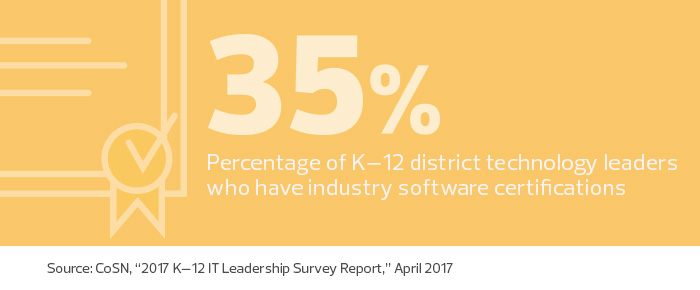Educators Gain Valuable Tech Experience Through Industry Certifications
All 138 teachers in Chagrin Falls Exempted Village Schools are Level 1 Google Certified Educators.
Earning those certifications in 2016 did not come cheaply: Teachers devoted precious time to prepare for the three-hour exam, and the Ohio school district footed the bill for training, support and test fees. But when the entire teaching staff understands how to use the arsenal of Google tools to support learning in their classrooms, the benefits far outweigh the cost, says Mike Daugherty, the district’s director of technology and information systems.
Officials deemed the certification program essential, says Daugherty, because Chagrin Falls — whose four schools serve about 2,000 students from two suburban Cleveland communities — had issued HP Chromebooks to every K–12 student, and was moving to adopt Gmail and Google Drive.
“We looked at the skills we wanted our teachers to have, and certifications were how we made sure they got them,” he says. “Our superintendent made it a policy that everyone had to be certified by the end of the year, and we designed a program to help them.”
More schools are encouraging or requiring teachers to obtain industry certifications as technology makes further inroads into the classroom. Several major technology companies, including Adobe, Microsoft and Google, offer teachers the chance to gain certifications like those earned by Chagrin Falls. Districts use them to boost teachers’ credentials and experience, as well as expand their own programs.
Certification programs provide teachers with the competence and confidence they need to effectively integrate technology into their classrooms, create a learning technology community (as the GCE program did in Chagrin Falls), and connect educators to a broad network of like-minded professionals offering ideas and support for technology-assisted teaching strategies.
SIGN UP: Get more news from the EdTech newsletter in your inbox every two weeks!
Certifications Make for Strategic Training Opportunities
Certifications can result in real value to the teachers who earn them, but districts should evaluate the usefulness of each one carefully, and understand the burden such work places on teachers, says Associate Professor Linda Mensing-Triplett, director of middle and high school programs at Lesley University in Cambridge, Mass.
“Some districts identify a group of teachers with technology skills or interests, urge them to get relevant certifications and then use those teachers as resources, which isn’t a bad strategy,” Mensing-Triplett says.
Start by matching a certification to a teacher’s classroom technology environment, says Mensing-Triplett. Districts often choose Google certifications, for example, because many use the company’s network and apps, she says.
“Certifications should be part of a robust classroom technology plan,” Mensing-Triplett says.

PD Designed for Teachers by Teachers
Chagrin Falls began its Google certification program by polling teachers to find out what preparation for the exam they wanted: group training sessions, one-on-one work with a technology integrationist or preparing on their own. Daugherty and his team offered group training sessions in the spring and fall, as well as a summer boot camp. The district’s technology integrationist, Nancy Kevern, dedicated 105 days of her time to the certification effort, Daugherty says.
“The most important factor in getting all the teachers certified was designing the training around them,” says Daugherty. “Teachers have a lot of demands on their time, and you have to respect that and give them flexibility.”
The process had a few challenges. Educating teachers (as well as the teacher’s union) on the significance and importance of what 100 percent Google Certification could mean for students and future learning in Chagrin Falls was paramount. Once that was achieved, the district had to develop strategies to help exam takers retake the exam successfully if they did not pass on the first attempt. And training for the certification exam left less time for other professional development efforts.
In the end, the teachers, superintendent and two dozen Chagrin Falls administrators and staff passed the test and became Google Certified Educators.
“Even the tech-savvy people said they learned things, and all the teachers gained baseline skills and confidence,” Daugherty says. “Most important, teachers now use the technology to give more feedback to students and streamline administrative tasks. That will free up more of their time.”
Know What to Teach in the 21st Century
In some districts, the law requires teachers to obtain industry certifications. In Florida, every school district must offer at least one career and technical education program that leads to outside credentials, says Janice Scholz, director of CTE for Brevard Public Schools (BPS), which serves 73,000 students from 17 communities along the state’s Space Coast. “We offer industry certification preparation for students within the career and technical education classes, and Florida statutes require that teachers have the same certifications, preferably at a higher level, in order to teach them,” Scholz says.
Most BPS teachers hold Microsoft Certified Educator and Adobe Certified Associate and Expert certifications, but thanks to the array of certification programs offered to BPS students, teachers also hold dozens of industry credentials for other technology, including AutoDesk, Solidworks, JavaScript and more. Some teachers who work outside of the career education program also earn industry certifications, but receive most technology training (which is focused on specific applications) in-house from the district IT staff.
BPS provides training for teachers who are working to be certified, and pays for their tests, Scholz says.
“We almost never encounter resistance from teachers, and we make sure we give them the support they need,” she says. “The expectation from parents and the public is that we will teach our students how to use the latest technology, and we can’t meet that expectation without mastering the technology ourselves."

Incentives Help Teachers Seek Training
Craig Bates regrets that he didn’t build a formal technology industry certification program for teachers in Talladega County (Ala.) Schools, a suburban Birmingham district that serves 7,600 students in 17 schools. After 25 years in the district, Bates retired from his post as coordinator of instructional technology in August to take a private sector job.
“One initiative I hope goes forward is the creation of a formal program that trains teachers and provides incentives for them to get certifications,” says Bates, a Google Certified Educator. More important, the students of teachers with industry certifications benefit from their instructor’s competence, Bates says. Industry-certified educators also act as pollinators, sparking interest in industry certifications as well as technology training, he adds.
When designing a professional development plan, teachers’ input is crucial to a certification program. “District technologists have to make the case for the value of certifications,” Bates says. “Then, administrators and teachers should work together to create a program that meets teachers’ needs and offers support to help them be successful.”








